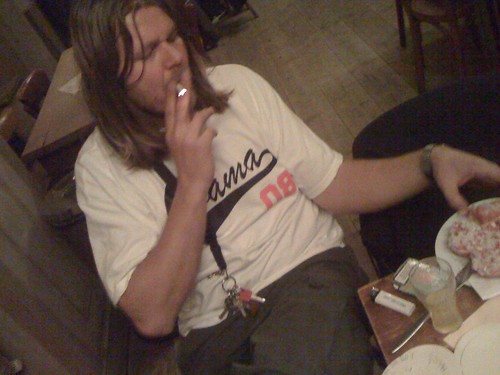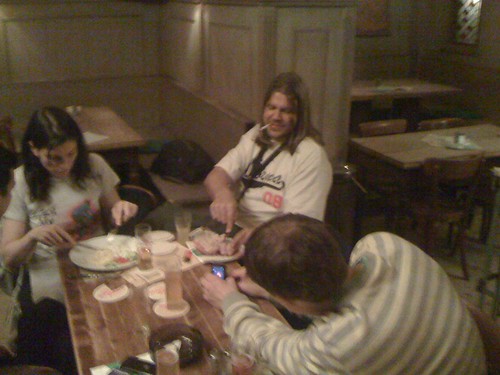Rockin' the Stammtisch
Sunday, 17 August 2008 by kinakoJam

I wish one of us had had a proper camera that night at Brauhaus Putz. I love how my colleague Wulf looks like a weather-beaten politico who just spent 23 hours in the war room, and is now enjoying a well deserved fag with some raw mince.
Maybe some Republicans think Germany is full of people like this: who wear Obama t-shirts and smoke Players P&S while eating raw mince & onion on crisp white buns.
On the subject of smoking & eating, I was just reading an article from February last year about the latent smoking ban in Germany. It quotes Claudia Picht, whose organic café Metzgerei Schmitz was an extreme anomaly last year with its self-imposed smoking ban. She was quoted as saying "I don't see the non-smoking principle of my café as a prohibition, but as a special offer to those people who want some fresh air." Aw.
"They keep telling the barkeepers that a smoking ban would decrease their rates. I think people have to be very courageous to say: 'I will do it anyway! I will turn my bar into a non-smoking place.' And then they find out that drinking coffee can also be wonderful without a cigarette!'"
Meanwhile the old guard of non-organic sausage-loving Germans is represented by Meinolf Saure, the owner of the monolithic Brauhaus Früh. He is quoted as saying "I cannot support a general ban, for a bar without smoke would be nothing." But he admits that he is also happy about the non-smoking areas. "We have established them on every level of our bar and they are a huge success."
The jury is still out on whether eating a raw mince mettwurst brötchen without a cigarette can also be wonderful.
Ironically, my workmate Wulf took up smoking again when he was in North America. The smoking ban in Toronto meant that people would go outside for a chat and a fag, and since he is so tall he found this an easier way to converse than trying to shout down at people in the noisy club.
As New Years approached last year, I was less excited about clinking glasses of 'sekt' bubbly than I was about the promised moratorium on smoking, about to be introduced in clubs. Most eating and drinking venues in Germany are not air-conditioned. The ban felt long overdue - other European countries with a strong penchant for smoking had banned it in public spaces, what felt like ages ago (Italy, Ireland, England, even France). Not without protest. A Parisian cafe-owner, Olivier Colombe, was quoted in the Independant last December as saying "Long dinners with several bottles of wine and lots of discussion are going to be difficult".
It sounds like he needs to sit down for a delicious cup of coffee with the über-upbeat Claudia Picht.
Just before New Years, the governors of North Rhein Westphalia decided that they would push the start of the ban back so that the fine Kölle folk could smoke it up during the traditional carnival season. Then, when I thought the ban would finally trudge into effect on July 1st, a loop-hole was discovered to allow smaller venues who don't have room for a 'non-smoking' area to become members' smoking clubs.
The Federal Constitutional Court ruled on July 30th in favour of plaintiffs who said the constitutional rights to property and to exercise one’s profession were at stake, easing smoking bans for at least 60,000 one-room establishments. It's a convenient loop hole that has been jumped on enthusiastically by all the local discotheques (which are, by the way, not necessarily all that small).
The Economist wrote on the 24th of July that "The German Hotel and Restaurant Association says smoking bans have cost small bars and restaurants 30% of their revenues. That shakes a pillar of social life: the Stammtisch, a regulars’ table at the corner bar where fellowship is forged. If people cannot smoke at Köpi, says its bartender, “we would lose our regulars”.
Anti-smoking campaigners have long found Germany a hard case. Last year the Swiss Cancer League ranked the tobacco-fighting zeal of 30 European countries, and placed Germany 27th. The new smoking bans might improve its ranking, but they are riddled with 130 exemptions, complains Martina Pötschke-Langer, of the German Cancer Research Centre."
130 exemptions is quite an achievement in my opinion. That's something worth bragging about. I'm amazed at the number of loopholes that the normally fastidious Germans have allowed to permeate this veritable legislative sieve. And 'strict' is clearly a matter of interpretation.
Five days ago, bloomberg.com published the following confusing news item. The court begins by upholding the law with no members' club exceptions in straight-laced Bavaria, but then sidles around it by claiming that smoking in beer tents (which also serve a number of Bavarian food delicacies) can be allowed until the end of the year because it is of a temporary nature.
"The Bavarian law is in line with a July 30 ruling that permits smoking bans as long as they don't allow for exceptions, the Karlsruhe-based Constitutional Court said today. Allowing smoking in beer tents until the end of this year doesn't breach rules because the exemption is of a temporary nature, it said. The Bavarian state law, one of the strictest in Germany, doesn't apply to clubs with a restricted membership because they aren't open to the public."
Say whut? Isn't saying something is allowed simply because it's temporary, the very definition of an exception?
Bavaria, sorry mate, I don't think you are as strict as you are cracked up to be.
Most people I've asked still don't think the tobacco lobby is especially strong here: they think all this poking loop-holes in the fabric of the law is down to the strength of the German Hotel and Restaurant Association (DEHOGA). The DEHOGA insists that as long as the consumption of tobacco is not generally forbidden it should remain a personal decision whether or not to smoke in a bar.
But some, like Claudia Picht, are pretty sure the tobacco lobby is meeting up with the DEHOGA in some war rooms of their own.
The Economist commented that it is hard to prove, although cigarette ladies are a fixture at political parties’ conventions. "Germany has conducted no large-scale campaign on the dangers of passive smoking, says Dr Pötschke-Langer. Despite boosting taxes recently, cigarettes are still cheaper than in Britain and Ireland. The share of the adult population that smokes has dropped from more than half in 1950 to around a third, but smoking rates remain among the highest in Europe."


Smoking bans are empowered only by the fact; most non-smokers do not like the smell of tobacco smoke; sum and total. A political win by the majority rules, although most don't care, they never did, beyond the perspective of what brings them comfort as the ruling perspective.
The truth in respect to the legitimate "fear" can be seen by how many actually run away from what is said to be a mortal danger with no safe level? How many have been prosecuted, or could be, for attempt murder or common assault with a deadly weapon by smoking in the presence of others?
There is no legitimate danger or fear, the lie supports comfort, nothing more.
There are other perspectives, despite what you may have be taught by the advertisers and promoters, who pay a lot of money to convince you their is a legitimate harm found, in normal exposures seen in respect to second hand smoke.
Tax exempt RWJF for instance, gambled a half a Billion [with a B] dollars, confident they could convince us, "smokers" are different from the rest of us. The profits and increased stock values of a large block of stock they hold in Johnson and Johnson [their protected tax adjusted parent] demonstrates the investment paid off large. As does the increased value of Philip Morris stock, since the Tobacco Papers and the Tobacco settlements saw them at an all time low, shows clearly they are dong pretty well, reinvigorated by the anti smoker movement as well.
What is really wrong with smoking bans?
Beyond the lies, lies by omission and exaggerations, the statistical deceit, the financial costs and incredible levels of profiteering, or the long list of other damages to otherwise peaceful and co-operative communities. Realization of huge mistakes made, shortly after they were made, the last time this nanny state theology was popular, might help to refresh our memories.
The scientific community was never humbled by the realization of the horrors they inflicted on the world, they simply pointed at others. Just as they do today, shamelessly protecting their benefactors, they blame the users, to deflect our contempt away from the product.
As good cop bad cop routines play out, not a single raised eyebrow of concern is seen, by the realization the same hated industry executives [as the dragon] also supply the bulk of processed foods on your child’s dinner plate under the alias of Kraft or Nabisco. Enticements sold with the same targeted methods, being used now to present themselves as your protectors and as your proxy, which permits the same targeting of your children, through carefully worded advertising and politics, which in large part is now also seen in their classrooms.
From the document UNESCO and its program, 111
The race question.
From the preamble we find;
“The great and terrible war which has now ended was a war made possible by the denial of the democratic principles of the dignity, equality and mutual respect of men, and by the propagation, in their place, through ignorance and prejudice, of the doctrine of the inequality of men and races.
And of course;
“Knowledge of the truth does not always help change emotional attitudes that draw their real strength from the subconscious or from factors beside the real issue.”
In its final conclusions in the opinion of Scientists world wide, it was stated;
“Man is born a social being who can reach his fullest development only through interaction with his fellows. The denial at any point of this social bond between man and man brings with it disintegration.”
http://unesdoc.unesco.org/images/0012/001282/128291eo.pdf
It really is worth the read. If for no other reason, to help understand what is inherently wrong with smoking bans. The same promotions of inciting hatred utilizing incredibly the identical slogans and catch phrases, which should have caught the attention of all of us.
Divisions are being formed by comparing groups of people, to claim superiority, or harms to be feared. De-generative advertisements are being employed by large well heeled groups, identifying themselves only as Public Health Authorities, operating as a cult movement and spreading the same gospel targeting groups of otherwise innocent and normal human beings with; denormalization “”campaigns””.
“A particularly vicious and mean expression of the Caste spirit. It involves belief in the innate and absolute superiority of an arbitrarily defined human group over other equally arbitrarily defined human groups”
Anyone who has bought into this corrosion of communities, even to a small degree, has been trapped, by the threat of being described as hypocritical, if you resist buying into the complete package and the unbridled hatred we have all witnessed in the past.
Thanks for your enthusiasm!
An interesting outlook you have there.
I'd like to reassure you wholeheartedly that I for one would not stop being friends with someone because they are a smoker. i might stop being friends with them if they put little bits of arsenic in my coffee. but i think a little hazardous social interaction with cigarette smokers is quite ok every now and then. but i do think that people should have a choice if they want to inhale passively or not.
One example of a credible-sounding study proving the risks of passive smoking was back in '81, reported by the New York Times. The National Cancer Research Institute in Japan did a 14 year study. They recorded a two-fold increase in death rates from lung cancer for non-smoking women with smoking husbands.
"The relative risk of developing cancer was much higher in various subgroups, particularly in agricultural families. The risk of developing lung cancer for nonsmoking wives of agricultural workers 40 to 59 years old who smoked two or more packages of cigarettes each day reached 4.6 times that of nonsmokers in agricultural areas, where the study's findings could not be complicated by urban air conditions.
The study, conducted from 1965 to 1979, involved 142,857 women and 122,261 men 40 and older in 29 of the about 800 health center districts in Japan. Those totals represented from 91 to 99 percent of the census population in each district. The study was undertaken to measure the effects on health of a wide variety of factors, such as cigarette smoking, alcohol drinking, occupation and marital status.
Because detailed questions about personal habits, including smoking habits, were asked of husbands and wives separately at the start of the study, Dr. Hirayama said he could specifically determine the effect of the husbands' smoking on the risk of lung cancer in nonsmoking wives.
There were 346 deaths from lung cancer in women recorded in 14 years of follow-up. Of these women, 245 were married, and 174 of these were nonsmokers. These cases occurred among 91,540 nonsmoking married women whose husbands' smoking habits were studied.
Smoking was the only habit of the husbands to affect the deaths of wives, and the link was so highly significant by statistical tests that it ''was not the result of chance,'' Dr. Hirayama said.
The husbands' smoking habits did not affect their wives' risk of dying from other cancers or conditions, such as heart attacks. Nor did the husbands' drinking habits have any effect on lung cancer or any other cause of death among the wives.
Sir Richard Doll, a British physician at Oxford University who did pioneering studies linking cigarette smoking and lung cancer, said in an interview that Dr. Hirayama's study ''was scientifically sound.'' The effect of passive smoking on nonsmoking wives was ''surprising'' because it was larger than he would have expected, he said.
''The implication'' is that cigarette smoking poses ''a hazard to anybody in public rooms if they are not well ventilated,'' Dr. Doll said.
Anyway, on a positive note, here's an interesting alternative: try smoking marijuana instead!
check this article from the Washington Post:
Study Finds No Cancer-Marijuana Connection
By Marc Kaufman
Washington Post Staff Writer
Friday, May 26, 2006; A03
The largest study of its kind has unexpectedly concluded that smoking marijuana, even regularly and heavily, does not lead to lung cancer.
The new findings "were against our expectations," said Donald Tashkin of the University of California at Los Angeles, a pulmonologist who has studied marijuana for 30 years.
"We hypothesized that there would be a positive association between marijuana use and lung cancer, and that the association would be more positive with heavier use," he said. "What we found instead was no association at all, and even a suggestion of some protective effect."
Federal health and drug enforcement officials have widely used Tashkin's previous work on marijuana to make the case that the drug is dangerous. Tashkin said that while he still believes marijuana is potentially harmful, its cancer-causing effects appear to be of less concern than previously thought.
Earlier work established that marijuana does contain cancer-causing chemicals as potentially harmful as those in tobacco, he said. However, marijuana also contains the chemical THC, which he said may kill aging cells and keep them from becoming cancerous.
Tashkin's study, funded by the National Institutes of Health's National Institute on Drug Abuse, involved 1,200 people in Los Angeles who had lung, neck or head cancer and an additional 1,040 people without cancer matched by age, sex and neighborhood.
They were all asked about their lifetime use of marijuana, tobacco and alcohol. The heaviest marijuana smokers had lighted up more than 22,000 times, while moderately heavy usage was defined as smoking 11,000 to 22,000 marijuana cigarettes. Tashkin found that even the very heavy marijuana smokers showed no increased incidence of the three cancers studied.
"This is the largest case-control study ever done, and everyone had to fill out a very extensive questionnaire about marijuana use," he said. "Bias can creep into any research, but we controlled for as many confounding factors as we could, and so I believe these results have real meaning."
Tashkin's group at the David Geffen School of Medicine at UCLA had hypothesized that marijuana would raise the risk of cancer on the basis of earlier small human studies, lab studies of animals, and the fact that marijuana users inhale more deeply and generally hold smoke in their lungs longer than tobacco smokers -- exposing them to the dangerous chemicals for a longer time. In addition, Tashkin said, previous studies found that marijuana tar has 50 percent higher concentrations of chemicals linked to cancer than tobacco cigarette tar.
While no association between marijuana smoking and cancer was found, the study findings, presented to the American Thoracic Society International Conference this week, did find a 20-fold increase in lung cancer among people who smoked two or more packs of cigarettes a day.